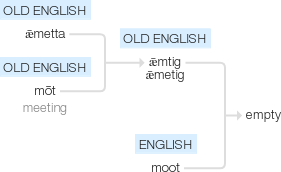Empty
Old English ǣmtig, ǣmetig ‘at leisure, empty’, from ǣmetta ‘leisure’, perhaps from ā ‘no, not’ + mōt ‘meeting’ (see moot).
wiktionary
From Middle English emty, amty, from Old English ǣmtiġ, ǣmettiġ(“vacant, empty, free, idle, unmarried”, literally “without must or obligation, leisurely”), from Proto-Germanic *uz-(“out”) + Proto-Germanic *mōtijô, *mōtô(“must, obligation, need”), *mōtiþô(“ability, accommodation”), from Proto-Indo-European *med-(“measure; to acquire, possess, be in command”). Related to Old English ġeǣmtiġian(“to empty”), Old English ǣmetta(“leisure”), Old English mōtan(“must, might, have to”). More at mote, meet.
The interconsonantal excrescentp is a euphonic insertion [1] dating from Middle English.
etymonline
empty (adj.)
c. 1200, from Old English æmettig, of persons, "at leisure, not occupied; unmarried" (senses now obsolete), also, of receptacles, "containing nothing," of places, "unoccupied," from æmetta "leisure."
Watkins explains it as from Proto-Germanic *e-mot-ja-, with a prefix of uncertain meaning + Germanic *mot- "ability, leisure," possibly from PIE root *med- "take appropriate measures." A sense evolution from "at leisure" to "containing nothing, unoccupied" is found in several languages, such as Modern Greek adeios "empty," originally "freedom from fear," from deios "fear." "The adj. adeios must have been applied first to persons who enjoyed freedom from duties, leisure, and so were unoccupied, whence it was extended to objects that were unoccupied" [Buck].
The -p- is a euphonic insertion. Of words, etc., "destitute of force or effect," mid-14c. Related: Emptier. The figurative sense of empty-nester is attested by 1960.
empty (n.)
"an empty thing" that was or is expected to be full, 1865, from empty (adj.). At first of barges, freight cars, mail pouches.
empty (v.)
1520s, from empty (adj.); replacing Middle English empten, from Old English geæmtigian. Related: Emptied; emptying.
